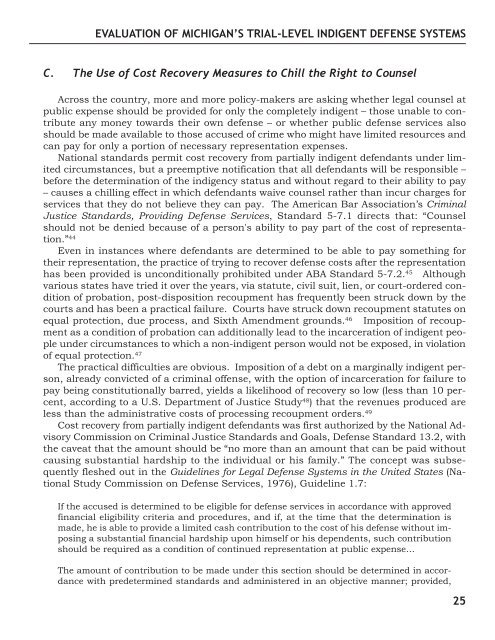Evaluation of Trial-Level Indigent Defense Systems in Michigan
Evaluation of Trial-Level Indigent Defense Systems in Michigan
Evaluation of Trial-Level Indigent Defense Systems in Michigan
Create successful ePaper yourself
Turn your PDF publications into a flip-book with our unique Google optimized e-Paper software.
EVALUATION OF MICHIGAN’S TRIAL-LEVEL INDIGENT DEFENSE SYSTEMS<br />
C. The Use <strong>of</strong> Cost Recovery Measures to Chill the Right to Counsel<br />
Across the country, more and more policy-makers are ask<strong>in</strong>g whether legal counsel at<br />
public expense should be provided for only the completely <strong>in</strong>digent – those unable to contribute<br />
any money towards their own defense – or whether public defense services also<br />
should be made available to those accused <strong>of</strong> crime who might have limited resources and<br />
can pay for only a portion <strong>of</strong> necessary representation expenses.<br />
National standards permit cost recovery from partially <strong>in</strong>digent defendants under limited<br />
circumstances, but a preemptive notification that all defendants will be responsible –<br />
before the determ<strong>in</strong>ation <strong>of</strong> the <strong>in</strong>digency status and without regard to their ability to pay<br />
– causes a chill<strong>in</strong>g effect <strong>in</strong> which defendants waive counsel rather than <strong>in</strong>cur charges for<br />
services that they do not believe they can pay. The American Bar Association’s Crim<strong>in</strong>al<br />
Justice Standards, Provid<strong>in</strong>g <strong>Defense</strong> Services, Standard 5-7.1 directs that: “Counsel<br />
should not be denied because <strong>of</strong> a person's ability to pay part <strong>of</strong> the cost <strong>of</strong> representation.”<br />
44<br />
Even <strong>in</strong> <strong>in</strong>stances where defendants are determ<strong>in</strong>ed to be able to pay someth<strong>in</strong>g for<br />
their representation, the practice <strong>of</strong> try<strong>in</strong>g to recover defense costs after the representation<br />
has been provided is unconditionally prohibited under ABA Standard 5-7.2. 45 Although<br />
various states have tried it over the years, via statute, civil suit, lien, or court-ordered condition<br />
<strong>of</strong> probation, post-disposition recoupment has frequently been struck down by the<br />
courts and has been a practical failure. Courts have struck down recoupment statutes on<br />
equal protection, due process, and Sixth Amendment grounds. 46 Imposition <strong>of</strong> recoupment<br />
as a condition <strong>of</strong> probation can additionally lead to the <strong>in</strong>carceration <strong>of</strong> <strong>in</strong>digent people<br />
under circumstances to which a non-<strong>in</strong>digent person would not be exposed, <strong>in</strong> violation<br />
<strong>of</strong> equal protection. 47<br />
The practical difficulties are obvious. Imposition <strong>of</strong> a debt on a marg<strong>in</strong>ally <strong>in</strong>digent person,<br />
already convicted <strong>of</strong> a crim<strong>in</strong>al <strong>of</strong>fense, with the option <strong>of</strong> <strong>in</strong>carceration for failure to<br />
pay be<strong>in</strong>g constitutionally barred, yields a likelihood <strong>of</strong> recovery so low (less than 10 percent,<br />
accord<strong>in</strong>g to a U.S. Department <strong>of</strong> Justice Study 48 ) that the revenues produced are<br />
less than the adm<strong>in</strong>istrative costs <strong>of</strong> process<strong>in</strong>g recoupment orders. 49<br />
Cost recovery from partially <strong>in</strong>digent defendants was first authorized by the National Advisory<br />
Commission on Crim<strong>in</strong>al Justice Standards and Goals, <strong>Defense</strong> Standard 13.2, with<br />
the caveat that the amount should be “no more than an amount that can be paid without<br />
caus<strong>in</strong>g substantial hardship to the <strong>in</strong>dividual or his family.” The concept was subsequently<br />
fleshed out <strong>in</strong> the Guidel<strong>in</strong>es for Legal <strong>Defense</strong> <strong>Systems</strong> <strong>in</strong> the United States (National<br />
Study Commission on <strong>Defense</strong> Services, 1976), Guidel<strong>in</strong>e 1.7:<br />
If the accused is determ<strong>in</strong>ed to be eligible for defense services <strong>in</strong> accordance with approved<br />
f<strong>in</strong>ancial eligibility criteria and procedures, and if, at the time that the determ<strong>in</strong>ation is<br />
made, he is able to provide a limited cash contribution to the cost <strong>of</strong> his defense without impos<strong>in</strong>g<br />
a substantial f<strong>in</strong>ancial hardship upon himself or his dependents, such contribution<br />
should be required as a condition <strong>of</strong> cont<strong>in</strong>ued representation at public expense…<br />
The amount <strong>of</strong> contribution to be made under this section should be determ<strong>in</strong>ed <strong>in</strong> accordance<br />
with predeterm<strong>in</strong>ed standards and adm<strong>in</strong>istered <strong>in</strong> an objective manner; provided,<br />
25



